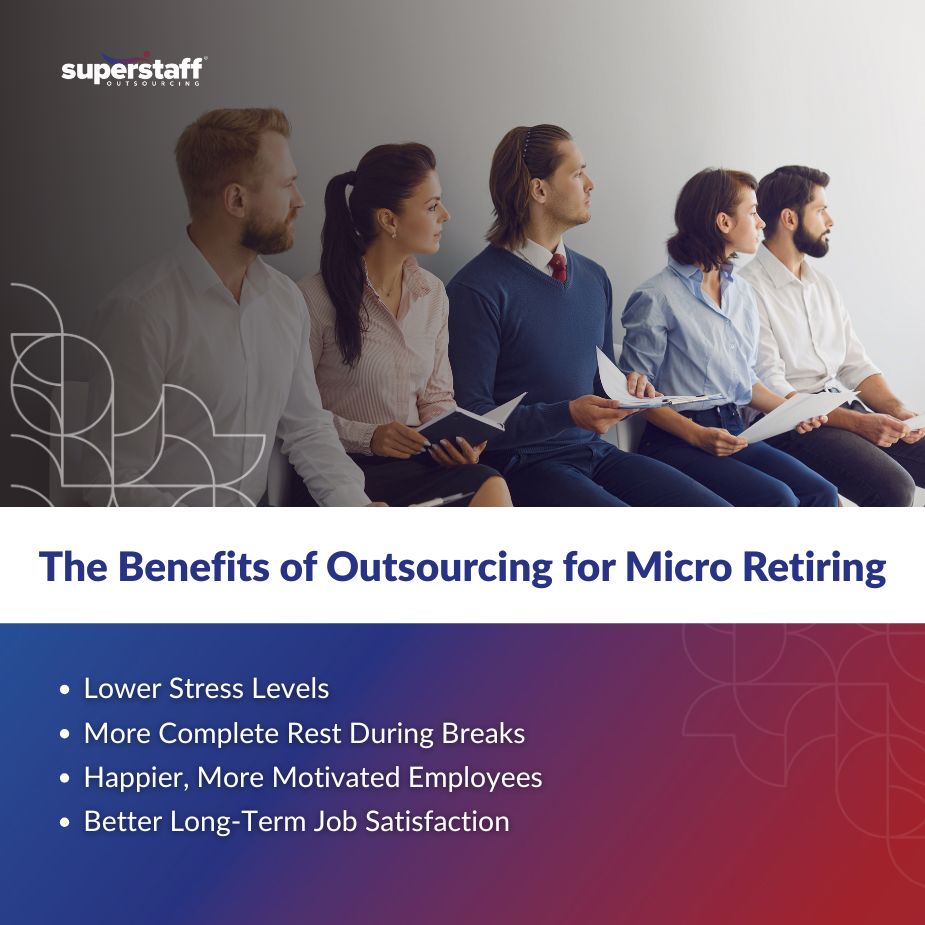
Today, more employees are taking short breaks throughout their careers to rest, travel, or focus on personal goals. Unlike traditional retirement, these breaks, known as micro-retirements or micro retiring, are temporary and help individuals return to work with renewed energy and focus. This shift reflects the growing need for better work-life balance.
While these breaks benefit employees, they can be tough for businesses. When someone takes time off, their work still needs to be done, which can cause delays or put pressure on the rest of the team.
That’s where outsourcing comes in. By partnering with external support teams, businesses can keep operations running smoothly while employees are away, avoiding overburdening other staff and maintaining productivity.

The Growing Trend of Micro-Retirement and Employee Well-being
Burnout is hitting younger workers harder than ever. Studies show that 81% of employees aged 18 to 24 and 83% of those aged 25 to 34 report feeling burned out. These numbers point to a major shift in how people view work and personal well-being.
Micro-retirement is one way employees are responding. Instead of waiting until the end of their careers to take a break, more people are stepping away for shorter periods to rest, travel, or take care of personal matters, then returning to work with more focus and energy. This reflects a shift toward modern employee benefits trends, where flexible time off and wellness are prioritized over traditional perks.
Businesses that make space for these breaks are seeing the payoff. Supporting short-term time off helps prevent burnout, keeps teams productive, and improves employee retention. It’s a practical step toward building a more stable and motivated workforce.
The Challenges of Maintaining Productivity During Employee Absences
When employees take extended time off, businesses still need to meet deadlines and keep customers happy. Without a plan in place, the extra work can fall on the rest of the team.
This can lead to:
- Overworked employees
- Missed deadlines
- Delays in serving customers
- Lower team morale
It’s also hard to find someone who can quickly step in and do the same job, especially if the work is specialized or technical. Hiring and training temporary staff takes time, and often, there’s not enough time to do it properly.
Without support, the stress builds up, and the quality of work can suffer. To address these challenges, many companies are exploring outsourcing for business continuity as a reliable solution when internal capacity is stretched.
Outsourcing as a Strategic Tool During Micro Retiring Phases
When an employee takes a short break or sabbatical, their tasks still need to be completed. This is where outsourcing can help.
Outsourcing refers to collaborating with a trusted external company that provides skilled professionals to handle specific tasks. These jobs can include customer service, data entry, accounting, administrative support, marketing tasks, or technical work, depending on your business’s needs.
Here’s how it helps during micro-retirements:
-
Keep Work on Track
Outsourced staff can take over daily tasks so that nothing falls behind while your employee is away. Your projects can continue to move forward without delays.
-
Prevents Overworking Other Employees
Without extra help, the remaining team members may have to take on more work. This can lead to stress and burnout. Outsourcing balances the workload, allowing everyone to stay productive and less overwhelmed.
-
Quick and Flexible Support
Most outsourcing partners already have trained staff ready to work. This means you can get help right away—no need to go through long hiring or training processes.
-
No Need for Permanent Hires
If the extra support is only needed for a short time, outsourcing provides a way to fill the gap without hiring someone full-time.
-
Matches the Right Skills to the Right Tasks
Outsourcing companies provide individuals with experience in specific tasks. You can hire someone who already knows how to do the job well, with a minimal learning curve.
In short, outsourcing allows you to keep your business running smoothly when someone takes a break. It gives you the flexibility to adjust without slowing down operations or overburdening your team.
The Benefits of Outsourcing for Employee Recharge and Well-being
When companies use outsourcing to cover short absences due to micro retiring, employees feel more comfortable taking time off. They know their work will be handled, and they won’t come back to a mountain of unfinished tasks.
This leads to:
- Lower stress levels
- More complete rest during breaks
- Happier, more motivated employees
- Better long-term job satisfaction
Encouraging employees to take breaks isn’t just beneficial for individuals—it’s also beneficial for the entire team. A rested employee is more focused, more creative, and more committed to their work.
Outsourcing also supports a healthier workplace culture. It demonstrates to employees that their well-being is a priority and that the company is committed to supporting them both personally and professionally.
Scaling Operations with Outsourcing During Micro-Retirement
Outsourcing enables businesses to adjust their operations when workloads fluctuate. For example, if several employees are out at the same time or a new project creates extra work, outsourcing partners can step in quickly.
Once things return to normal, businesses can reduce the amount of support they’re using. There’s no need to hire permanent staff if the extra help is only needed for a short period.
Key benefits of outsourcing for flexible operations:
- Easier to adjust staffing based on business needs
- Faster response to changes in workload or customer demand
- No long-term commitments
- Smooth transitions when employees leave or return from breaks
This flexibility enables companies to manage change effectively without losing momentum. It’s a smart way to keep up with business needs while supporting your team.
Keeping Your Business Moving While Your Team Recharges
As micro retiring becomes more common, businesses need ways to support this shift without slowing down. Businesses need ways to maintain productivity without placing undue pressure on the rest of the team. Outsourcing is one of the most effective ways to achieve this.
By collaborating with external partners, companies can maintain operational continuity during employee absences, mitigate the risk of burnout among their remaining staff, foster a healthier work-life balance, and cultivate a more adaptable and resilient workplace.
Business leaders should view outsourcing not just as a backup plan, but as a strategic response to the rise of micro-retirements and their impact on modern workforce planning. With the proper support, you can give your team the time they need to rest, without slowing down your business.
Let SuperStaff help you create a stronger, more supportive workplace where employees can thrive and operations run smoothly.






